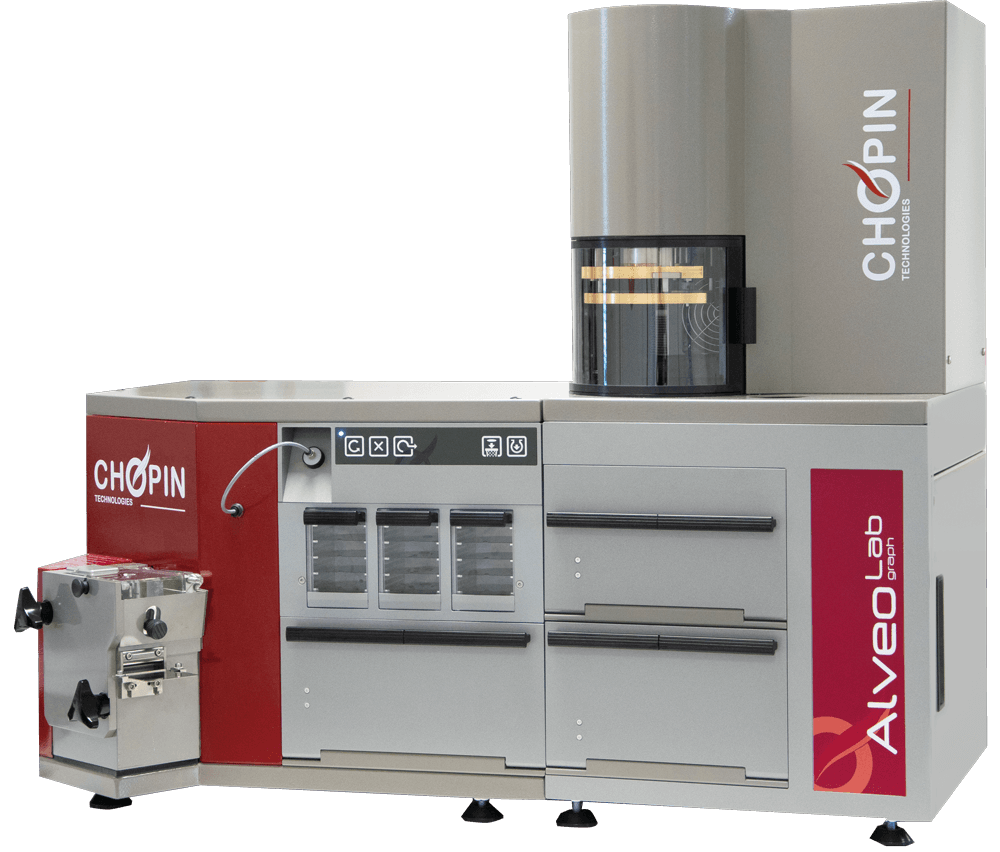
A simplified version of the Alveolab® used to conduct standard Alveograph tests at constant hydration in a laboratory where temperature and humidity are perfectly controlled.
Measure Tenacity, Extensibility, Elasticity, & Baking Strength of Dough
The AlveoPC meets international standards for use in analyzing key parameters of dough. It is easy to use with a simple, modern user interface and meets standardized testing procedures.
Read how the CHOPIN Alveograph products are being used in the industry:
National Center for Biotechnology Information: https://www.ncbi.nlm.nih.gov/pmc/?term=alveolab
Google Scholar: https://scholar.google.com/scholar?hl=en&as_sdt=0%2C5&q=alveograph+chopin&btnG=
Benefits
- Understand dough behavior to ensure consistency in appearance, size, aroma, and structure.
- Monitor incoming wheat or flour to ensure you are starting with high-quality ingredients
- Improve efficiency by conducting multiple tests throughout the day
- Acts as a reference measurement for grains and cereals, both for quality control and developing new products
- Measure and adapt flour according to specifications
- Use proven, industry-standard analysis for your testing procedures
Features
- Provides universally recognized measurements for the main rheological properties – tenacity, extensibility, elasticity, and baking strength
- Can be used for both hard and soft wheat
- Easy to use – simple, modern and intuitive interface
- Standardized data export for integration into a LIMS
- Standardized analysis – meets AACC 54-30, ICC 121, NF EN-ISO 27971, and GOST 51415-99 standards
Applications
Internationally Recognized As The Industry Standard Reference for Grains & Cereals
The AlveoPC is used by millers and bakers all over the world to provide test results that serve as reference for grains and cereals, both for quality control and developing new products.
Typical applications include:
- Wheat selection for baked goods or pasta
- Wheat or flour blends
- Vital gluten
- Salt and sugar impacts
- Additives and ingredients (proteases, amylases, deactivated yeasts, etc.)
- Insect contaminated wheat












Lineup

Alveolab® - Automated and Fully Controlled Testing
- Temperature and hygrometry control
- More data from a single test
- Software displays comprehensive test data
- All data is backed up to ensure perfect traceability
- Additional protocols and standards, including NEW whole wheat flour test protocol and adapted hydration test*
- Intuitive and complete software including a blending law tool and assistance to select the most suitable additive to obtain target values
* Optional Alveo-AH kit required
Product Lineup
How It Works
Simplified Option for Controlled Environments & Constant Hydration
The Alveograph analyzers are the industry standard tools used to measure rheological properties of dough. Rheological properties of dough indicate how it will perform in the production process, which includes:
- Machinability
- Stickiness
- Ability to keep its shape, whether it will spread or shrink
- How it will develop during fermentation

For Quality Control
The AlveoPC is a benchtop analyzer for technicians that only conduct standard Alveograph tests at constant hydration, and work in a laboratory where temperature and humidity are perfectly controlled.
- Simplified system for users that already have a fully-controlled testing environment.
- The dough bubble is formed from below versus above in the Alveolab®.
- Results are provided in graphical and table format to quickly assess the dough behavior.
The Test Involves Four Main Steps
The Alveograph® test is conducted by first producing a test piece of dough, and then injecting air into a thin patty of that dough to form a bubble, simulating gas (carbon dioxide) release and retention during dough fermentation and baking.
- Mixing flour and salted water
- Preparing five calibrated pieces of dough
- Putting these pieces of dough to rest
- Automatically inflating each piece of dough until the resulting bubble bursts
No need to wait until the end of the test to prepare a new one: as soon as the mixing bowl is free, you can start the next test.

Extrusion and Cutting of Dough Pieces
- Resting plates have a high-resistance anti-adhesive coating to facilitate the preparation of dough pieces.
- Dough cutter is semi-automatic and very easy to use.

System Components
The Alveograph® devices are composed of two main elements: a kneading machine to create a dough sample for testing, and the Alveograph® itself, which measures the extension of a dough bubble formed by air pressure. The AlveoPC is a simplified version of the Alveolab® and meets international standards for use in analyzing key parameters of dough. It is easy to use with a simple, modern user interface and meets standardized testing procedures.
The main elements of the AlveoPC are:
- Mixer bowl
- Water tank
- Resting chamber
- Test platin
- Recording system (miniPC with installed software)

Measurements
Characteristic Curve and Measurements
When the test is complete, the results are expressed in five industry-standard values:
- Tenacity – ability of the dough to resist deformation when being stretched
- Elasticity – ability of a dough to spring back when it is stretched
- Extensibility – ability to stretch without breaking
- Baking strength – global energy necessary to deform the dough into a bubble until rupture

P: Tenacity (capacity to resist deformation)
Tenacity depends on water absorption capacity:
- Protein quantity and quality
- Starch damage
- Fibers (pentosans, ash content)
For a given hydration, tenacity represents the dough consistency (how hard a dough is)
L: Extensibility (maximum volume of air the bubble can contain)
Extensibility depends on:
- Protein quantity and quality (mainly)
- Extensibility represents the dough potential to stretch to hold gas (gas retention capacity)
Ie: Elasticity index, le = P200/P (P200: pressure at 4 cm from the beginning of the curve)
- Elasticity represents the capacity of a dough to stretch and return to its initial position when stress ends
- It is measured 40 mm after the beginning of the curve (L = 40)
- At this instant, the quantity of air injected in the bubble is 200 ml.
- The bubble volume at this instant indicates the dough resistance to deformation. It is a way to evaluate the elasticity.
W: Dough Baking Strength (area under the curve) or Energy Value
Baking strength depends on:
- Protein quantity and quality
- Starch damage
- Enzymes
- Interactions
P/L: Curve configuration ratio of tenacity and extensibility

Determine Which Flour is Suitable for Your Production
One flour is not “better” than the other, it depends on each industrial process and the product you are producing. You may prefer low tenacity for cookies, wafers, etc. or higher tenacity for sliced bread, panettone bread, etc. The Alveograph® test will allow you to determine the main characteristics of dough suitable for your end-product.
Software

Comprehensive and Intuitive Data
The Alveograph® software provides comprehensive, and intuitive data about tenacity, extensibility, elasticity, baking strength and more. A standard analysis certificate is automatically generated for use in checking the test results.The software displays easy-to-understand test data live on your PC and a backup is generated for perfect traceability. Results are provided in graphical and table format to quickly assess the dough behavior.
Comprehensive and Intuitive Data
The Alveograph® software provides comprehensive, and intuitive data about tenacity, extensibility, elasticity, baking strength and more. A standard analysis certificate is automatically generated for use in checking the test results.The software displays easy-to-understand test data live on your PC and a backup is generated for perfect traceability. Results are provided in graphical and table format to quickly assess the dough behavior.
Accessories
Accessories to Streamline Testing
The Alveograph® includes several helpful accessories to make testing easier and faster for users:
- Semi-automatic cutter for consistent patty size samples, and ease of processing
- TeflonTM -coated resting plates to avoid sticky residue and easy cleaning
- Reference flours to ensure accurate testing (optional)
- Dedicated CPU (MiniPC) running under Windows 10 IOT



Specifications
Frequently Asked Questions
The Alveolab and AlveoPC are capable of working with all types of hard and soft wheats. The Alveolab can also measure whole wheat dough properties.
If your lab is temperature and hygrometry control, you can use the AlveoPC. Otherwise, the Alveolab provides automatic regulation of temperature and hygrometry, meaning the results are independent of environmental conditions.
No, everything you need for preparation of the dough and to perform the test is integrated into the Alveolab and AlveoPC.
Paraffin oil and Sunflower oil can be substituted for peanut oil universally. Other oil types can be used, depending on the wheat used.
Resources
























